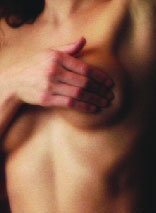Breast examination
| Breast self-examination | |
|---|---|
| Intervention | |

A woman examines her breast.
|
|
| MeSH | D016504 |
| MedlinePlus | 001993 |
Breast self-examination (BSE) is a screening method used in an attempt to detect early breast cancer. The method involves the woman herself looking at and feeling each breast for possible lumps, distortions or swelling.
BSE was once promoted heavily as a means of finding cancer at a more curable stage, but large randomized controlled studies found that it was not effective in preventing death, and actually caused harm through needless biopsies, surgery, and anxiety. Breast awareness is an informal alternative to structured breast self-examinations.
According to a meta-analysis in the Cochrane Collaboration, two large trials in Russia and Shanghai found no beneficial effects of screening by breast self-examination "but do suggest increased harm in terms of increased numbers of benign lesions identified and an increased number of biopsies performed." They concluded, "At present, screening by breast self-examination or physical examination cannot be recommended."
Although breast self-examination increases the number of biopsies performed on women, and thus revenue for the breast cancer industry, it does not reduce from breast cancer. In a large clinical trial involving more than 260,000 female Chinese factory workers, half were carefully taught by nurses at their factories to perform monthly breast self-exam, and the other half were not. The women taught self-exam detected more benign (normal or harmless lumps) or early-stage breast disease, but equal numbers of women died from breast cancer in each group.
Because breast self-exam is not proven to save lives, it is no longer routinely recommended by health authorities for general use. It may be appropriate in women who have a particularly high risk of developing breast cancer. Some charitable organizations, whose donations depend on promoting fear of breast cancer, still promote this technique as a one-size-fits-all, universal screening approach, even in the low-risk women who are most likely to be harmed by unnecessary invasive follow-up procedures. Among groups promoting evidence-based medicine, awareness of breast health and familiarity with one's own body is typically promoted instead of self-exams.
...
Wikipedia
